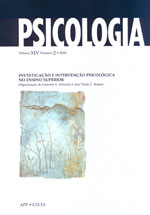Promoting Academic Success: a case study relative to the Chemistry Department of the Faculty of Sciences, University of Porto
DOI:
https://doi.org/10.17575/rpsicol.v14i2.508Keywords:
-Abstract
The present paper presents the broad lines of a plan for educational intervention in order to improve the situation detected in the Chemistry Department of the Faculty of Sciences, University of Porto, the main characteristic of which was the great “volatility” of its students. The idea is to act in the various aspects of the most important dynamic system in the department (its first degree in Chemistry), using a systematic approach. The most salient aim of this intervention is to increase the students’ motivation, presenting Chemistry in a more attractive way, with a curricular organization based on episodes or chemical storylines, following a tendency that as developed in the UK for Secondary Education that in recent years has been extended to the University’s first years (SALTERS curriculum originated at the Chemistry Department, University of York). The psychological basis of such an highly motivating approach is based on Tuvling’s distinction between semantic and episodic memory, implying that learning is more effective when one constructs his own knowledge, starting from cases or stories and finishing in the concepts. Three types of curricular activities are proposed: the stories – chemical storylines – presented as much as possible in an attractive and motivating newspaper format, covering all the most important chemical related problems of today’s world and everyday life, the chemical ideas, organized similarly to the current textbooks, but with links to the episodical structure of the chemical storylines, and the chemical activities, helping to consolidate the acquired knowledge and aptitudes. The inclusion of tutorial sessions and some other curricular modifications of the course, apart from the above first years ones, are proposed, as well as modifications in the structure of the degree and of the Faculty.


